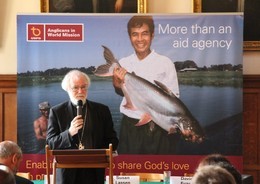Archbishop hosts launch of USPG's Hands on Health

Monday 26th September 2011
USPG Anglicans in World Mission launched their new health programme Hands on Health at Lambeth Palace on Monday 26th September.For many years, USPG has supported healthcare and hospitals in developing countries. With Hands on Health, USPG will help local churches bring health professionals, health volunteers and communities together to address concerns and work on solutions. The aim is that hospitals will have a sharper focus, communities will have more say in their health needs, and overall health will improve due to a greater emphasis on prevention.
Speaking in support of the programme, Archbishop Rowan Williams said
"It is easy to say that prevention is better than cure, but it takes courage and deep collaboration to turn this into a reality, transforming the health of communities. USPG is building on its considerable history in supporting mission hospitals and health clinics with an innovative approach that is very exciting."
USPG has launched the work in Zimbabwe and Malawi. The process is being monitored and the outcomes will be shared with USPG's church partners in other countries.
Archbishop Rowan hosted the official launch at Lambeth Palace, and concluded the event with the following remarks - read a transcript below, or click the download on the right to listen [9Mb]
One of the greatest problems that haunts the history of development thinking is to do with appropriate scale. How do we find the answers to these questions, not answers to questions in mid-air, answers to statistically-shaped questions, but answers to the questions that are actually being asked and the needs that are actually on the ground.
And that frequently means - as I think the development community is more and more recognising - asking what the effective local vehicles of delivery are, rather than assuming that we know the bureaucratic methods that will produce results.
So if the question is what is so radical about what's happening here I would say of course it's not new, not absolutely new, but that it is entirely in keeping with the gradual shift – very gradual in some secular NGO contexts, rather less gradual (happily) in some Christian contexts – the gradual shift towards listening to the questions that are actually being asked and therefore finding the right level, the right vehicle, for the delivery of solutions. I believe that's the most important thing that we're celebrating this morning.
People have spoken also about a moment of opportunity. I think that's extremely significant for us as Christian-based mission agencies. A moment of opportunity because, increasingly, the churches are stepping forward as the natural grassroots and civil society partners for schemes of development.
Development is not just a socio-economic matter – it's a matter of changing how people see themselves. That's part of what the gospel is about: changing people's sense of their possibilities. When that happens, many other things are unlocked. And the recognition that without that unlocking things won't change, is crucial at present. Again, what we're talking about today is a central aspect of that.
And just so that we're aware of it, I'd like to mention also the evolution of the Anglican Health Network. A couple of years ago at the last Anglican Consultative Council meeting in Jamaica, we had a very very powerful presentation about the need for an effective Anglican health network - a network across the Anglican Communion that connected the healthcare institutions and provisions offered by Anglicans right across the world, ranging from vastly sophisticated Episcopalian hospitals in Atlanta, through to very very very small‑scale delivery in central Africa or south-east Asia. That network is now moving forward very effectively and very fruitfully.
I think it's important that we think about this particular project we've been discussing this morning in the context of that global Anglican policy development towards doing some more joined-up thinking about how we share resources and how we share skills. So a moment of opportunity for the Communion as well as a moment of opportunity in our general attitudes socially and church-wise to development.
I'll just end by quoting from this USPG leaflet, because I think this sums up very much what this [launch] is about and why it's worth working with.
"Throughout the world, Anglican churches can be found at the heart of their communities. Indeed, in many cases, the church is the primary source of local knowledge – with the best capacity for delivering aid and other forms of practical assistance, using grassroots networks to reach people who are often overlooked by western agencies. It is within these communities that USPG is working with local churches to train leaders and build infrastructure."
That's the context within which all that we've discussed this morning should be set. That's the context which I believe is very well worth working with. It has been a great privilege to host this meeting this morning to discuss these exciting new developments.
